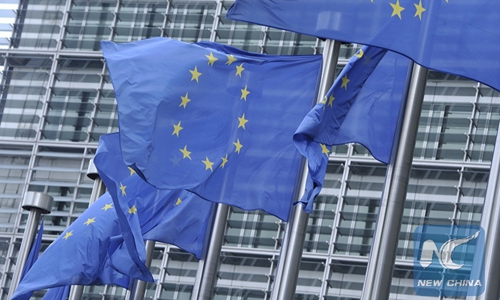China-EU bilateral investment treaty likely to be signed in 2021
By Li Xuanmin Source:Global Times Published: 2020/5/12 19:53:40
Pandemic gives momentum to pact, but 2020 signing may not occur

File Photo: The European Union flags flutter in front of EU headquarters in Brussels, Belgium. Photo: Xinhua
China and the EU may not be able to sign a proposed bilateral investment treaty (BIT) this year as scheduled, due to border control measures for pandemic prevention, which pose barriers in arranging face-to-face negotiations that are deemed vital in addressing many issues, industry insiders said.But both sides are motivated to push forward the negotiations, given that both face the urgent task of rejuvenating stalled economies and stabilizing supply chains disrupted by Covid-19.
Analysts say that if the BIT with EU is secured, it will serve as a bargaining chip for China to press for a phase two trade pact with the US.
During a phone call with China's Commerce Minister Zhong Shan on Monday, EU Trade Commissioner Phil Hogan said that the EU is satisfied with the progress on BIT talks and looks to make joint efforts with China to conclude negotiations within this year, according to a statement from China's Ministry of Commerce (MOFCOM) on Monday.
Zhong also noted that China is willing to work with the EU to accelerate BIT talks to shore up confidence in tackling the impact of the pandemic as well as deepening bilateral economic and trade cooperation.
Analysts said that the political will for China and the EU to make a breakthrough in the BIT talks is the strongest ever.
"The strong motivation is significant to narrowing divisions and resolving sticking points in the negotiations, such as the alleged subsidies to state-owned enterprises (SOEs). Sensing the urgency, the EU may make some concessions to China on this issue," Cui Hongjian, director of the Department for European Studies at the China Institute of International Studies, told the Global Times on Tuesday.
Industry insiders told the Global Times that there has been a shift in logic behind the talks since the pandemic began, where the focus of both sides moved from "having a deal to achieve something" to "signing a deal to avoid something."
On the EU side, the bloc aims to recast the deal as a kind of permit for Chinese firms to invest in Europe and an engine to restart its sinking economy. Some EU politicians have called for barring Chinese companies from acquiring EU companies.
On the Chinese side, Beijing looks to the deal to play a positive role to accelerate industrial and services integration with the EU bloc, as China's economic ties with the US are increasingly fraught due to the Trump administration's constant assault of China, industry insiders noted.
The two sides kept in communication even at the height of pandemic. In April, China and the EU held the 28th round of negotiations on the pact. The two sides made positive progress on texts and lists at that time, according to MOFCOM spokesperson Gao Feng.
Gao said that China and the EU have also talked about how talks will proceed in the next few months, with a new round of negotiations scheduled each month.
"The BIT is not an ordinary pact. It's more of a political agenda," Bai Ming, deputy director of the MOFCOM's International Market Research Institute, told the Global Times.
If a China-EU BIT is signed, it will offer leverage for China in the second phase of trade talks with the US, as similar tricky aspects of China-US disputes such as subsidies to SOEs could be a focal point, Cui said.
An EU summit with China is scheduled in September in Leipzig, Germany during which Chinese and EU leaders are expected to complete the last round of negotiations on some key issues, paving the way for a final text.
But it is not clear whether the meeting could be held on time due to the deadly virus. Cui said that even if the summit goes ahead, it will take several months for the European parliament to discuss and approve the pact.
"The best-case scenario is that the text of the deal could be finalized by the end of 2020, and China and the EU may sign it in the next year," Cui noted.
Beijing and Brussels agreed to start BIT talks in 2012, and the first round of negotiations was held in early 2014. China and the EU are supposed to sign the treaty by the end of 2020.
Newspaper headline: China, EU 'motivated' to reach BIT
Posted in: ECONOMY